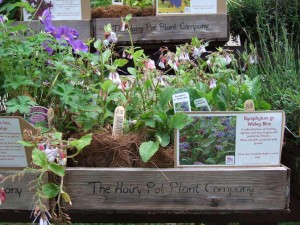Suppliers of climate-friendly plants and other stuff
Here are a few suggestions for suppliers of plants and other stuff.
Plants
If you’re prepared for that little bit more effort, and the patience to wait for your plants to grow, it’s always worth considering growing plants from seed. No need to worry about the compost the nurseries have used, or how much water they’ve used, or the hidden pesticides in your beautiful new plants. And plants grown from seed will usually be genetically more diverse, which means more resilience.
Of course if you want a specific cultivar then you’ll need to get a plant which has been propagated vegetatively rather than grown from seed. If you know somebody growing it already, why not ask them for a cutting or offset, and offer them something from your garden in exchange? Local horticultural societies or other community groups may have seed swap and plant swap days.
Otherwise it’s back to spending money on plants grown by professionals.
I’d almost always recommend buying plants from nurseries rather than garden centres, if you can make the effort, because, unlike garden centres, nurseries don’t usually sell shelf after shelf full of pesticides. (If you know of any really ‘green’ garden centres, let me know!)
The best resource for finding the nurseries which sell the plants you want, whether directly or by mail order, is the Royal Horticultural Society Plant Finder, which is available both online and also every year as a printed book. The nursery section of the book used to include a section on nurseries selling plants in several categories, including some useful for climate-friendly gardeners – ‘drought-tolerant plants’, ‘fruit’, ‘hedging’, ‘organic’, ‘peat-free’ – but sadly this part of the book no longer exists, nor does it exist anymore in online form. However it’s still worth watching out for the nurseries which list those things, and others like ‘edible plants’, ‘fruit and nut trees’, ‘ground-cover plants’, ‘nitrogen-fixing plants’, ‘permaculture plants’, ‘pesticide-free’, ‘shade plants’, ‘soft fruit’, or ‘woodland plants’ as part of their specialities in the nursery listings.
I’m not making any guarantees, but here are a few seed and plant nurseries selling edible and useful plants, and which I’ve either used myself and found good, or which I’ve heard are good from people I trust:
Agroforestry Research Trust
Chiltern Seeds
Cool Temperate
Edulis
Jekka’s Herb Farm
Keepers Nursery
Most nurseries are actually run by good people who take the responsibilities of their job very seriously, so please don’t assume that by naming a few nurseries I’m implying that any others are no good!
If you know of any good nurseries growing climate-friendly plants in climate-friendly ways please let me know.
Other stuff
Again, I’m not making any guarantees, but here are a few organisations selling things which I’ve either used myself and found good, or which I’ve heard are good from people I trust:
Ecopond
Green Gardener
Green Garden Shop
Hairy Pot Plant Company
Just Green
The Natural Gardener
Nemasys – nematodes to control pests
The Organic Gardening Catalogue
Permanent Publications Green Shopping
Gardening clothes
Gardening clothes made from sustainable materials, rather than wholly or partly out of plastics, and made in sustainable, climate-friendly ways, are hard to find, especially when you also want them to be made by workers who aren’t being exploited and underpaid.
(By the way, I suggest you don’t fall for the idea that things made from recycled plastics are somehow good for the planet. Scientists at Plymouth University found that each time a load of clothes made from plastics such as polyester and acrylic is washed, hundreds of thousands of plastic microfibres end up going into the water, and so into our rivers and soils and oceans.)
Here’s one ethical source of some good ethical, organic cotton clothes made in a wind-powered factory:
The Wildlife Trusts Clothing
The Wildlife Trusts’ clothes are made for them by the fabulous
Rapanui
who supply an even wider range of clothes not just in organic cotton but also in bamboo and British wool – check them out!
Even harder to find than clothes are shoes and boots to protect our feet. So here are two companies who make shoes from sustainable materials:
Conker Shoes
Green Shoes
This isn’t a supplier site, but is fascinating because it’s about growing plants which can become sustainable materials:
Flax and Hemp Project, Henfaes Research Centre, University of Wales, Bangor.
Please help add to this page!
I’m building this page up slowly – if you know of any other good suppliers, do let me know. Here are some examples of the kind of things that climate-friendly gardeners might find useful:
Plants sold bare-root or in peat-free compost in compostable pots, or seed:
perennial food plants
fruit
nuts
other perennial food crops
deciduous trees and shrubs
slow-growing hedge plants
ground-cover plants
nitrogen-fixing plants
rain-garden plants
native oxygenating plants for ponds
plants which feed wildlife
Peat-free compost
Sustainably harvested seaweed fertilizers
Compostable plant pots
Organic mulch materials
Sustainable pest and disease controls to use instead of synthetic persistent pesticides, such as wool pellets to deter slugs and snails
Water-butts
Watering cans
Garden furniture made of timber from sustainably managed woods
Compost bins made of timber from sustainably managed woods
Clothes lines and pegs made of timber from sustainably managed woods
Plant labels made of timber from sustainably managed woods
Compostable garden twine
Cleanburn woodburning stoves
Hand tools
Mulching mowers
Salvaged building materials, such as paving slabs and bricks
Gardening clothes made ethically from sustainable materials
Gardeners who are climate-friendly (and friendly to wildlife, soil and water)
Garden designers who are climate-friendly (and friendly to wildlife, soil and water)
Garden centres who sell only environmentally friendly stuff (surely they must exist somewhere…)

